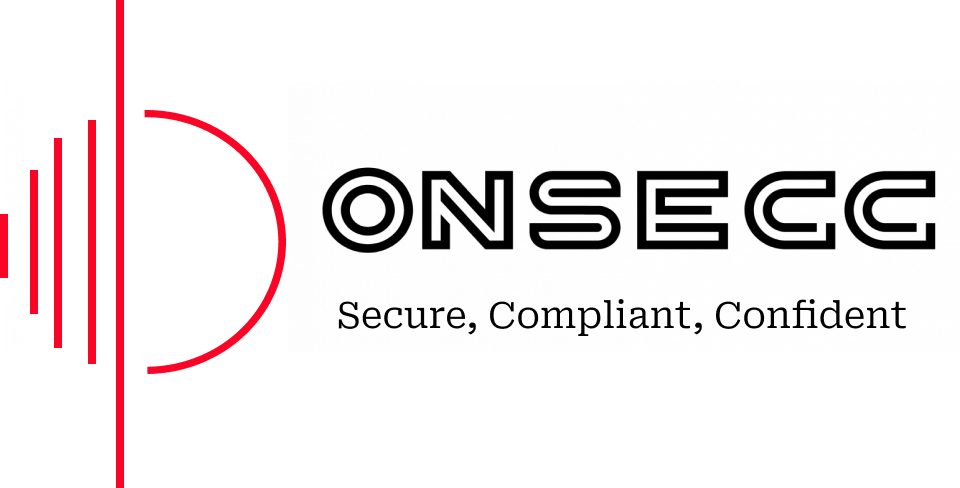Strategies to Enhance Cybersecurity for Business
Cybercrime poses a significant threat to modern businesses, impacting companies of all sizes and sectors. Predicting a cyber-attack is challenging, whether due to inadequate security measures or an employee mistakenly opening a malicious attachment. The consequences can be devastating, making it crucial for business owners to prioritize cybersecurity. Cybersecurity for Business is essential to mitigate these risks.
In This Article:

Understanding the Impact of Cyber Threats
While new threats continually emerge, robust cybersecurity tools and strategies can help safeguard valuable company data and protect employees and clients from digital threats. Here are essential cybersecurity tips to enhance business protection against cybercrime:
Generate a Strong Password Policy
Implementing a password policy is fundamental. Ensure that all users create strong, secure passwords that include:
- Lowercase and uppercase letters
- Special characters
- Numbers
- A minimum of 10 characters
Educate your team on creating strong passwords and enforce the policy across the organization. Since remembering complex passwords can be challenging, consider using a password manager to simplify password management.
Regular Security Awareness Training
Consistent security awareness training is vital for maintaining the health of your company. Even with technical support personnel, untrained employees can inadvertently cause security breaches. Training helps build a cybersecurity culture within your business, covering:
- Managing sensitive data
- Safe internet usage
- Creating secure passwords
- Protecting mobile devices
Antivirus and Antimalware Protection
Equip your business with professional-grade, up-to-date antivirus and antimalware software on all systems. Ensure all tools and systems used by employees have the latest operating system and software versions installed. If updates are available, install them promptly to maintain optimal protection.
Regular Backups
Having a robust backup policy is critical. Backups enable data recovery in case of accidents or ransomware attacks. Implement the 3-2-1 backup strategy:
- Three backup versions
- On two different media
- One offsite securely stored copy
Regularly test backups to ensure data can be recovered when needed.
Invest in Expert Cybersecurity Products
Invest in high-quality cybersecurity products from reputable specialists. Essential products to consider include:
- Antivirus software
- VPN applications
- Firewall applications
Keep these tools up-to-date to defend against current digital threats.
Limit and Manage Administrative Privileges
Carefully control administrative privileges within your organization. Only grant admin rights to those who absolutely need them and reconsider if necessary. For those with admin access:
- Limit access to sensitive information
- Use strong passwords to protect user accounts
- Regularly record and monitor access activities to detect unauthorized entry attempts
Conduct Penetration Testing
Simulate cyber-attacks on your own systems to identify vulnerabilities. Collaborate with IT experts or specialized companies to perform penetration testing. By uncovering security weaknesses, you can implement improvements to better protect your network, business, and customer data.
Implementing these strategies will enhance your business’s cybersecurity posture, ensuring robust protection against cyber threats. By staying proactive and vigilant, you can safeguard your company’s valuable assets and maintain the trust of your employees and clients.
The Relevance of Cybersecurity in the Modern Workplace
Moving a small business online can significantly boost brand development and open up new avenues for selling products or services. However, taking a business online also exposes it to cyber-attacks, necessitating a robust cybersecurity policy alongside a strong digital marketing strategy. Cyber-attacks can have devastating consequences, especially for small businesses, making it crucial to prioritize cybersecurity in the modern workplace.
The Impact of Cyber-Attacks on Businesses
Cyber-attacks can be detrimental to any organization, potentially resulting in:
- Loss of data and personal information
- Financial losses
- Compromised customer data and credit information
- Substantial reputation damage and identity issues
It is reported that up to 43 percent of all online cyberattacks target small businesses, largely because they are less likely to have comprehensive cybersecurity measures in place. Small businesses often lack dedicated cybersecurity teams and may not fully appreciate the depth of online security threats. Fortunately, specialized security firms can help mitigate risks and secure companies of any size. Meanwhile, here are some essential cybersecurity guidelines to protect businesses from online threats.
Encouraging Security Conversations within the Company
Promoting a culture of safety is vital. If cybersecurity is not a priority for employees, the company remains at high risk, as technology alone cannot cover gaps left by untrained personnel. Similar to not leaving the front door open despite having a security system, investing in cybersecurity technologies is ineffective if employees are not trained in secure online practices.
- Mandatory Security Awareness Training: Conduct annual or semi-annual training sessions to keep all employees updated on safe practices. Cybersecurity threats evolve, and employees need to stay informed to effectively avoid attacks. Quick responses to potential threats can minimize significant losses.
Distributing Cybersecurity Guidelines
Merely informing staff about cybersecurity practices is insufficient; organizations must hold employees accountable. Develop and distribute a comprehensive cybersecurity policy that includes:
- Identifying Scams: Guidelines on recognizing and avoiding scams.
- Developing Safe Passwords: Instructions on creating strong, secure passwords.
- Internet Usage: Rules on accessing the internet at work, potentially limiting or prohibiting personal use to avoid risky behavior.
The policy should also specify who manages security risks and outline the communication chain for reporting potential issues. Clear instructions on handling sensitive data and restricting access to authorized personnel or departments will enhance data security.
Encrypting Data
Encryption should be a standard practice in the workplace. Encrypting data ensures that even if unauthorized parties access it, they cannot read or use it without the correct authorization. This practice protects confidential information and secures communications between employees.
- Always Encrypt Data: Encryption prevents unauthorized access to sensitive information, making data breaches less damaging. Consistently encrypting emails and files minimizes the risk of leaks and protects the organization and its employees.
Investing in Professional Cybersecurity Solutions
Utilize professional-grade cybersecurity products, including:
- Antivirus Software
- VPN Applications
- Firewall Applications
Ensure these tools are regularly updated to defend against current threats. Consulting with cybersecurity experts can provide additional protection and insights tailored to your business’s specific needs.
Limiting and Managing Administrative Privileges
Control administrative privileges carefully to minimize the risk of unauthorized access:
- Grant Admin Rights Sparingly: Only provide admin access to those who absolutely need it.
- Monitor Access Activities: Regularly review access logs to detect and respond to unauthorized attempts promptly.
Conducting Penetration Testing
Simulate cyber-attacks to identify and address vulnerabilities within your security system. Working with IT experts or specialized companies to perform penetration testing helps uncover weaknesses and implement improvements to safeguard your network, business, and customer data.
By adopting these cybersecurity strategies, businesses can significantly enhance their protection against cyber threats. Proactive measures and continuous vigilance are essential to safeguarding valuable assets and maintaining the trust of employees and clients in the modern workplace.
Contact info
- 3rd Floor, 86-90 Paul Street, London, EC2A 4NE, UK
- +44-2034880245
- hello@onsecc.com
Share Blog On
Recent Posts:
-
 Strategies to Enhance Cybersecurity for Business
Strategies to Enhance Cybersecurity for Business -
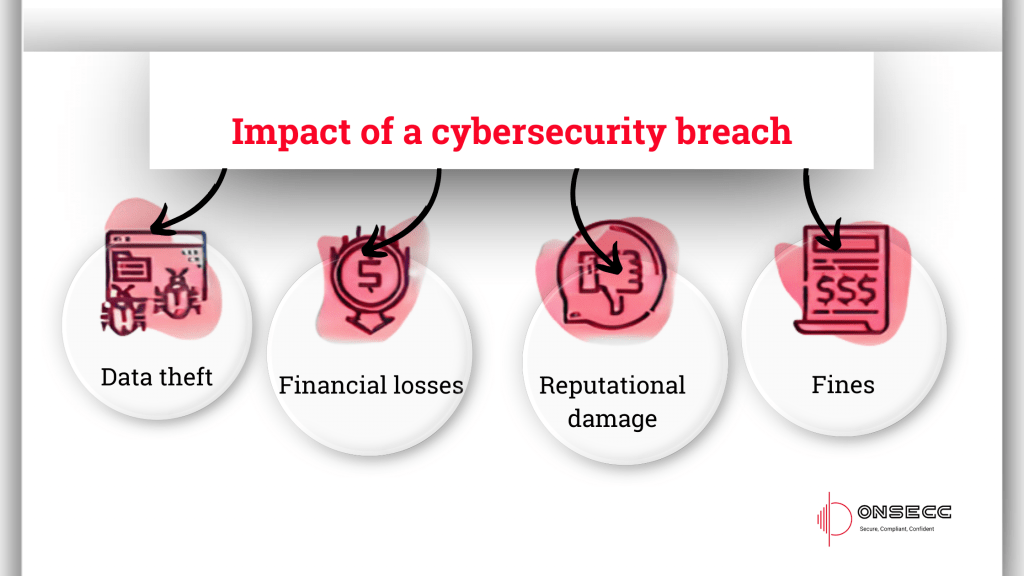 Impact of Cybersecurity Breaches on Compliance Status
Impact of Cybersecurity Breaches on Compliance Status -
 The Most Frequent HIPAA Violations in 2024 and How to Prevent Them
The Most Frequent HIPAA Violations in 2024 and How to Prevent Them -
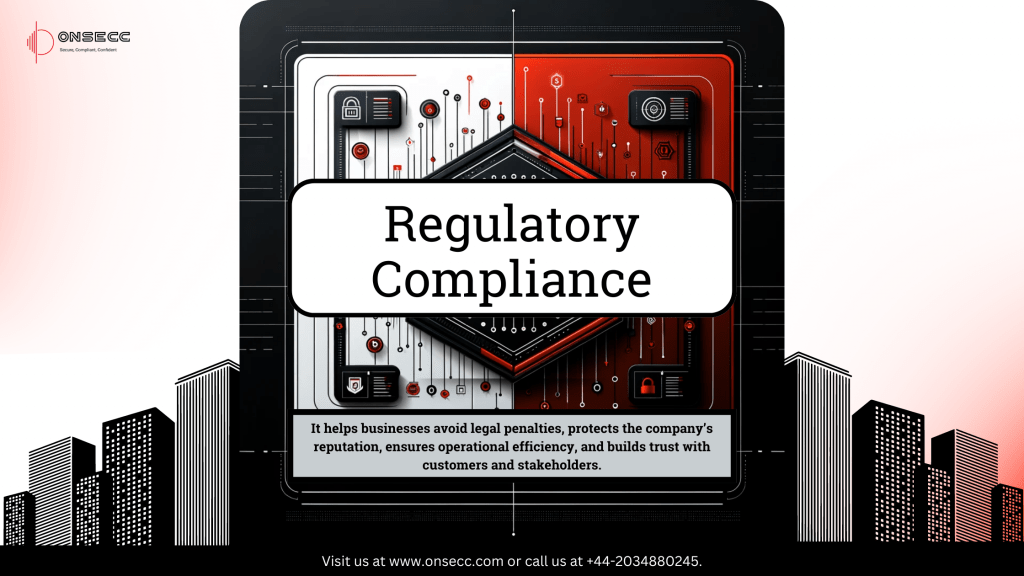 10 Essential Regulatory Compliance Tips Every Business Owner Must Know
10 Essential Regulatory Compliance Tips Every Business Owner Must Know -
 The Impact of Data Breaches: Insights from Recent Years and the Role of Onsecc in Safeguarding Business Interests
The Impact of Data Breaches: Insights from Recent Years and the Role of Onsecc in Safeguarding Business Interests -
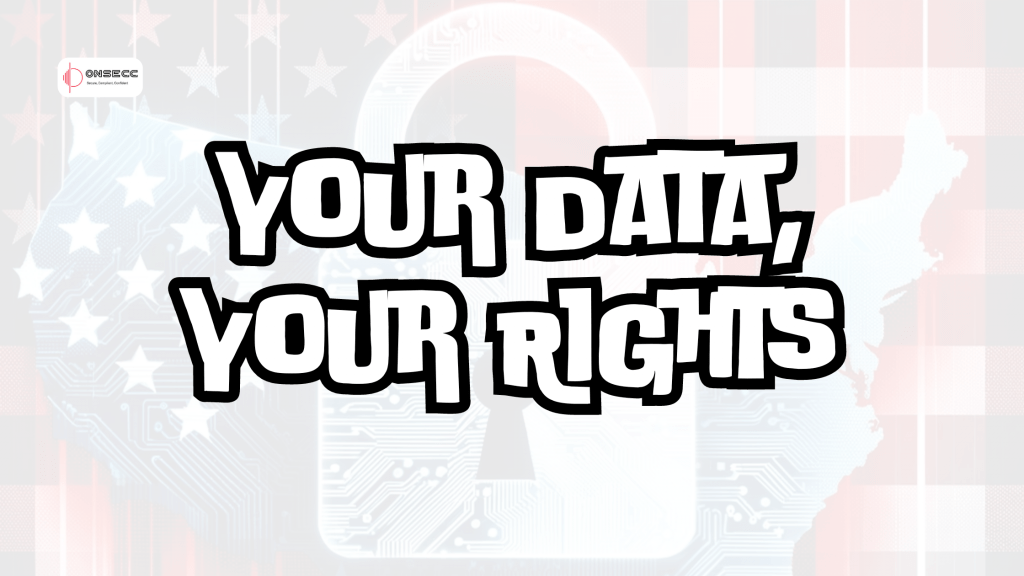 Navigating the American Privacy Rights Act: Understanding the Impact on the Privacy Landscape
Navigating the American Privacy Rights Act: Understanding the Impact on the Privacy Landscape -
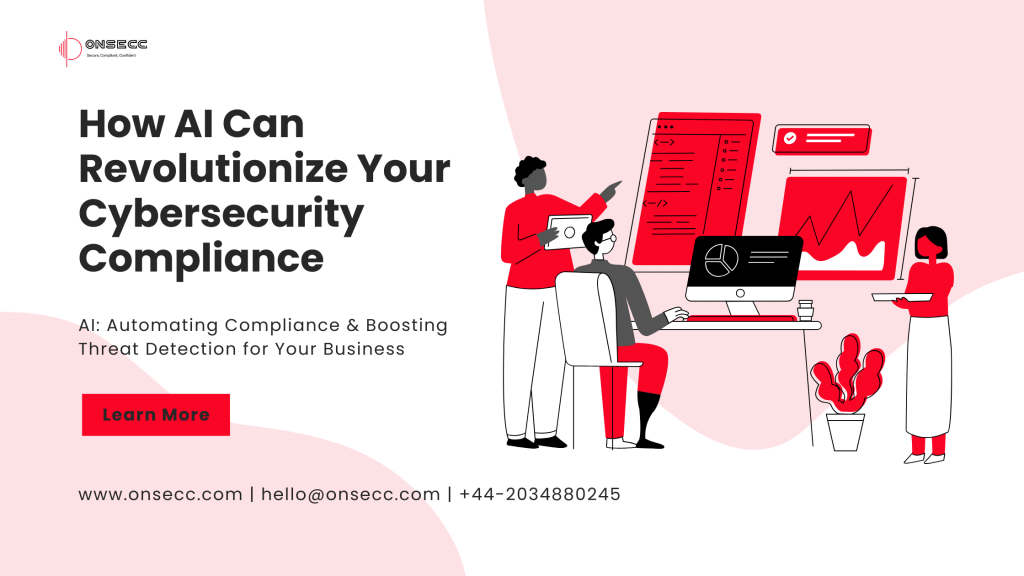 Ensuring Cybersecurity Compliance with AI: A Guide for Executive Leaders
Ensuring Cybersecurity Compliance with AI: A Guide for Executive Leaders -
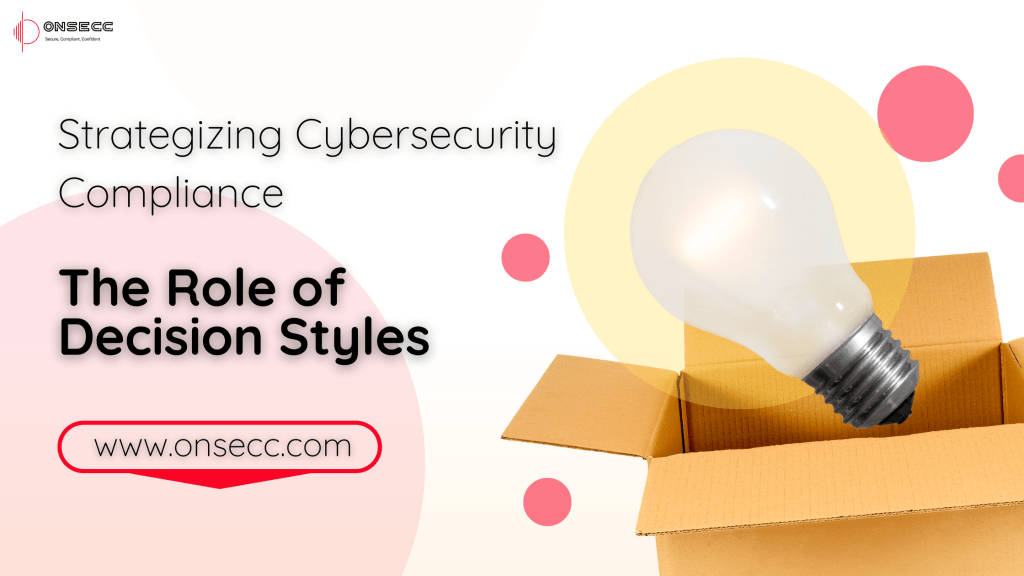 Understanding Cybersecurity Compliance Behavior: A Deep Dive Decision-Making Styles
Understanding Cybersecurity Compliance Behavior: A Deep Dive Decision-Making Styles
FAQs
Onsecc provides comprehensive cybersecurity compliance consulting, including audits, policy development, and risk assessments to help protect your business from digital threats.
Cybersecurity compliance ensures that your business meets industry standards and regulations, protecting sensitive data and maintaining customer trust.
Onsecc offers tailored solutions for small businesses, including security awareness training, penetration testing, and implementing robust security measures to safeguard your operations.
Yes, Onsecc offers free consultation calls to discuss your cybersecurity needs and provide initial recommendations. We also offer a 50% discount on your first service.
Regular security audits are crucial. We recommend conducting them at least annually, or more frequently if your business handles sensitive information or undergoes significant changes.
